A Brief Colonial History Of Ceylon(SriLanka)
Sri Lanka: One Island Two Nations
A Brief Colonial History Of Ceylon(SriLanka)
Sri Lanka: One Island Two Nations
(Full Story)
Search This Blog
Back to 500BC.
==========================
Thiranjala Weerasinghe sj.- One Island Two Nations
?????????????????????????????????????????????????Thursday, January 3, 2019
2018: Year-In-Review
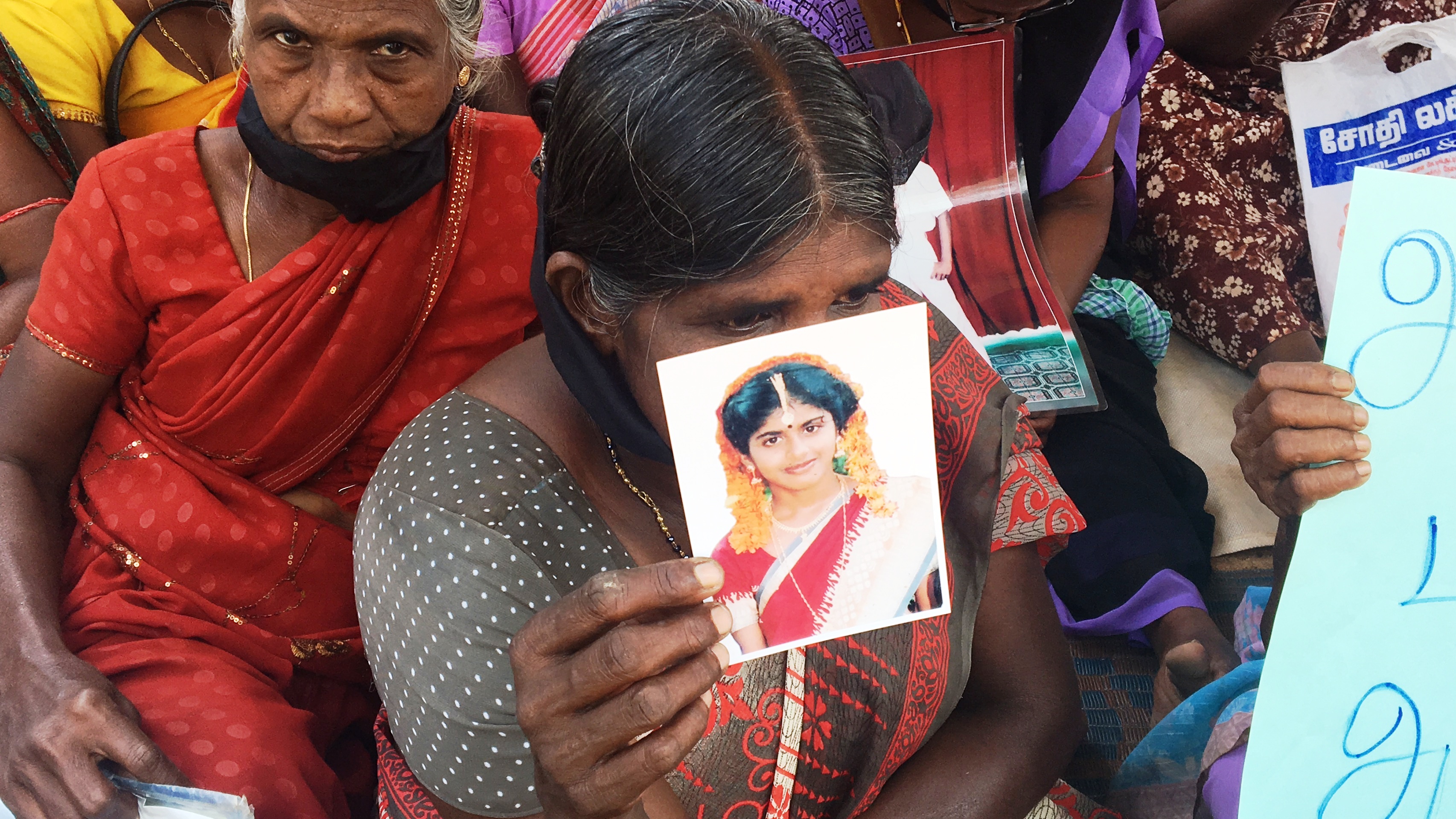 We look back at 2018's top news stories and significant issues through images from throughout the year.
We look back at 2018's top news stories and significant issues through images from throughout the year.
.jpg)
 02 January 2019
02 January 2019
Despite the calls for demilitarization of the North-East, the
military was persistent in its hold on large sections of land while also
directly impacting the livelihoods of Tamils through other means.
The integration of the Sri Lankan military into the everyday
lives of the Tamil people is seen through the opening on several new
army buildings, engagement with school children, and conducting
interviews for construction jobs in Tamil areas.
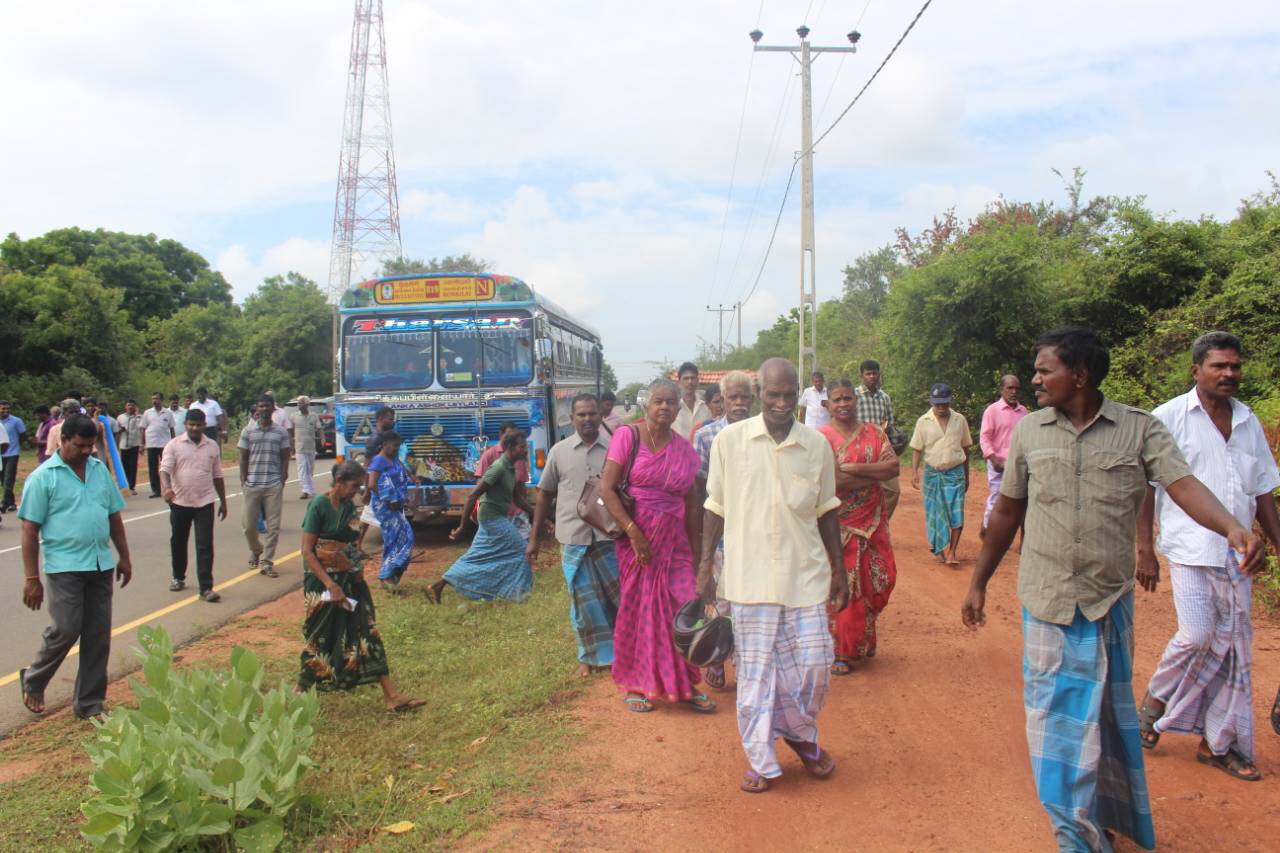
Residents in Mullaitivu responded to the Department of
Archaeology’s attempt to acquire more land by arriving in large numbers
to stop the officials who were setting up equipment to survey the land.
The residents demanded that they leave.
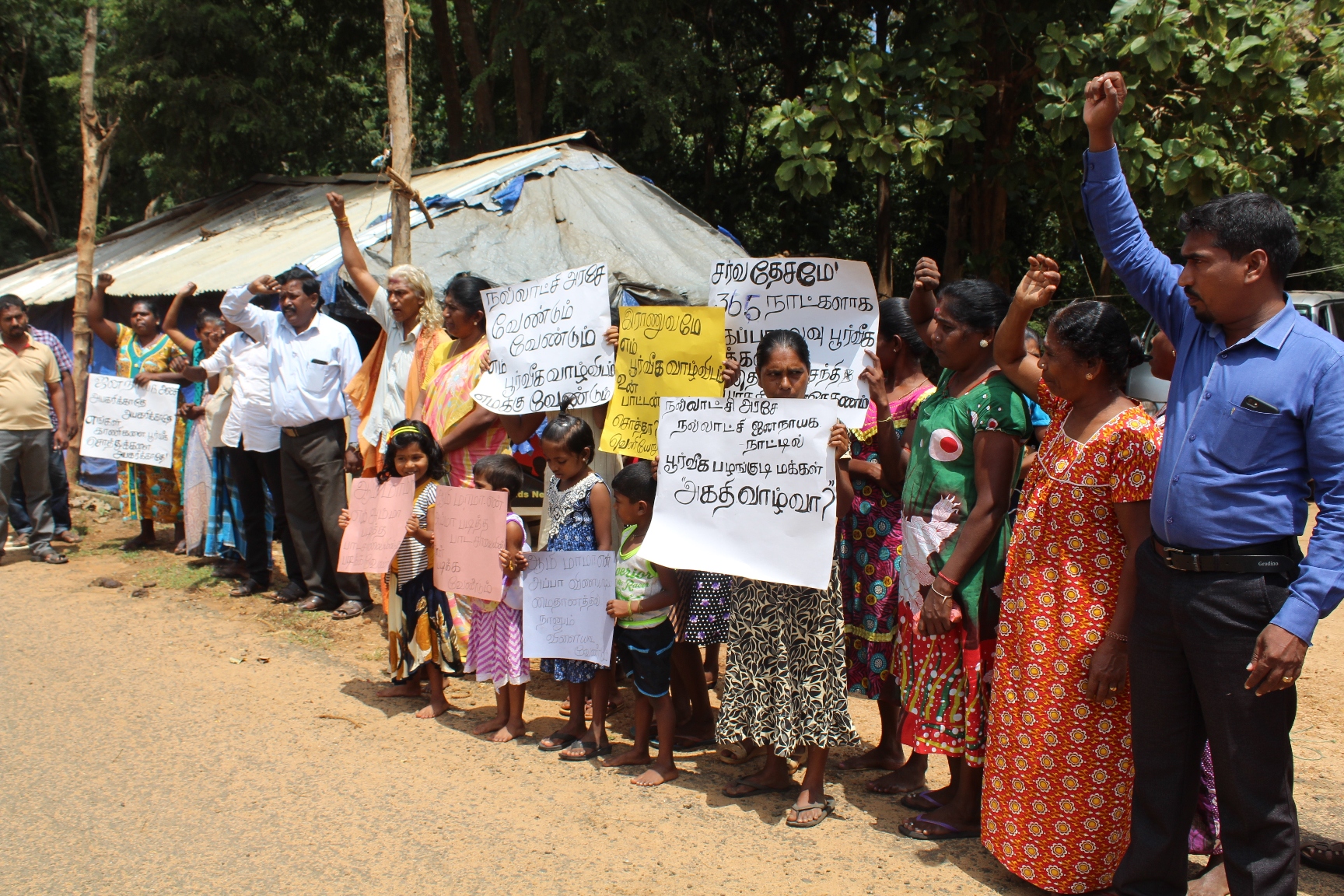
In Keppapulavu, families demanding the release of their land reached a year of protest in March and 500 days in July.
On the last day of the 2018, having reached day 671 of their
protest, the families attempted to enter their land, defying the army
that occupies it.
Army officials did not speak with them and instead photographed and filmed the protesting families.

Tamil women from Iranaitivu led a massive protest and sailed
back to their island and refused to leave until they were told their
land would be returned to them.
300 strong, the villagers raised white flags to show the occupying military that their protest was a peaceful one.
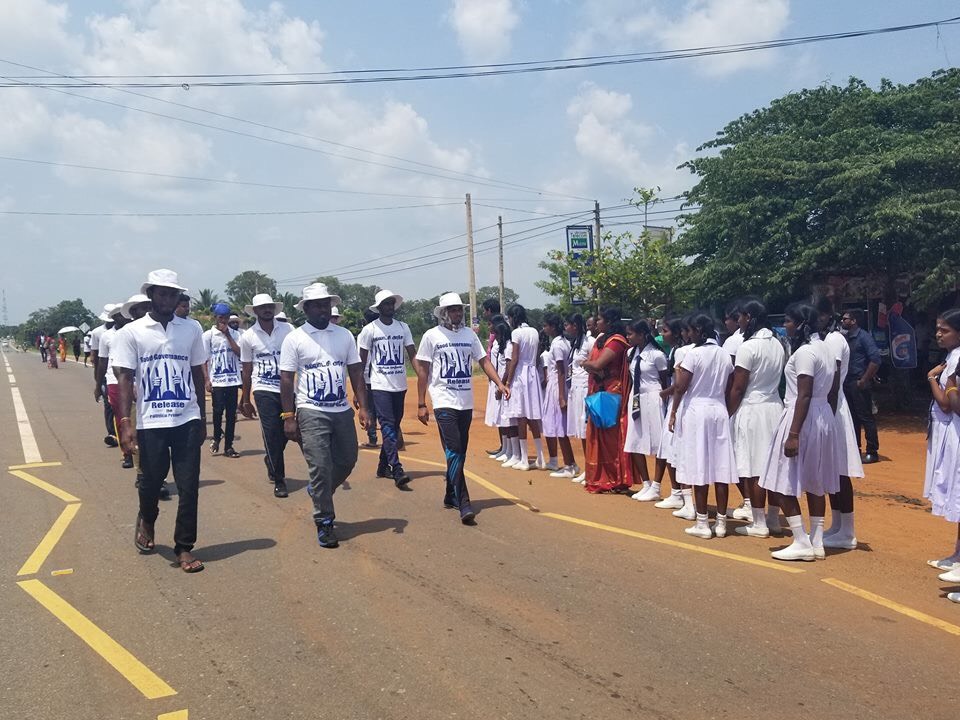
Throughout the year, protests demanding the release of all political prisoners were held across the North-East.
8 Tamil Political prisoners started a hunger strike in Anuradhapura prison in September.
Jaffna University students completed a 194 km march
to Anuradhapura prison, to intensify campaigns for the release of
political prisoners.
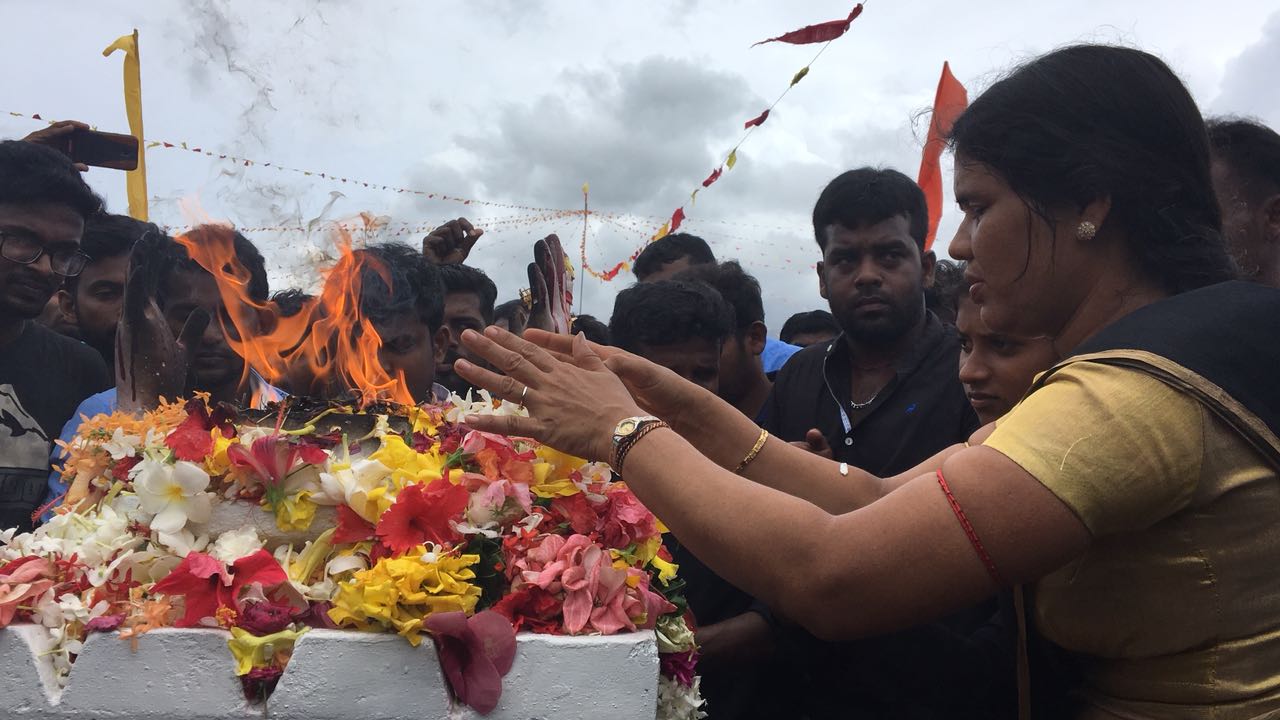
9 years later, Tamils, across the North-East, remembered the height of the genocide in 2009.
Families of the Disappeared reached a year of road side protests demanding information about their loved ones.
The families continued their protested despite the constant surveillance and intimidation by Sri Lankan intelligence.
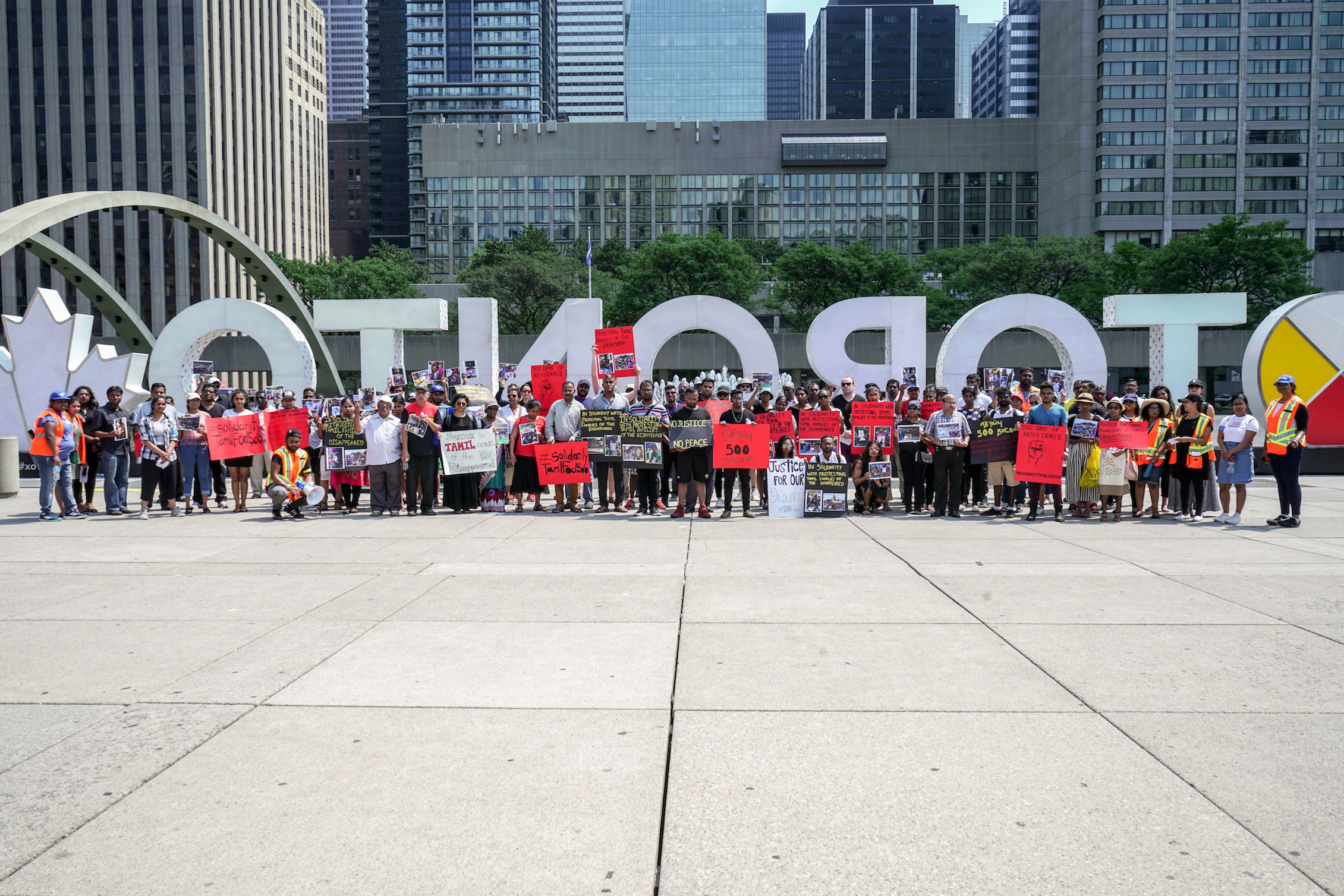 An independent collective of Tamil-Canadian activists
organized a rally in Toronto in solidarity with Tamil Families of the
Disappeared who were reaching 500 days of continuous roadside protests.
This rally kicked off a series of international rallies in London, Zurich, New York, Berlin, Vancouver, Belfast and Sydney.
An independent collective of Tamil-Canadian activists
organized a rally in Toronto in solidarity with Tamil Families of the
Disappeared who were reaching 500 days of continuous roadside protests.
This rally kicked off a series of international rallies in London, Zurich, New York, Berlin, Vancouver, Belfast and Sydney.
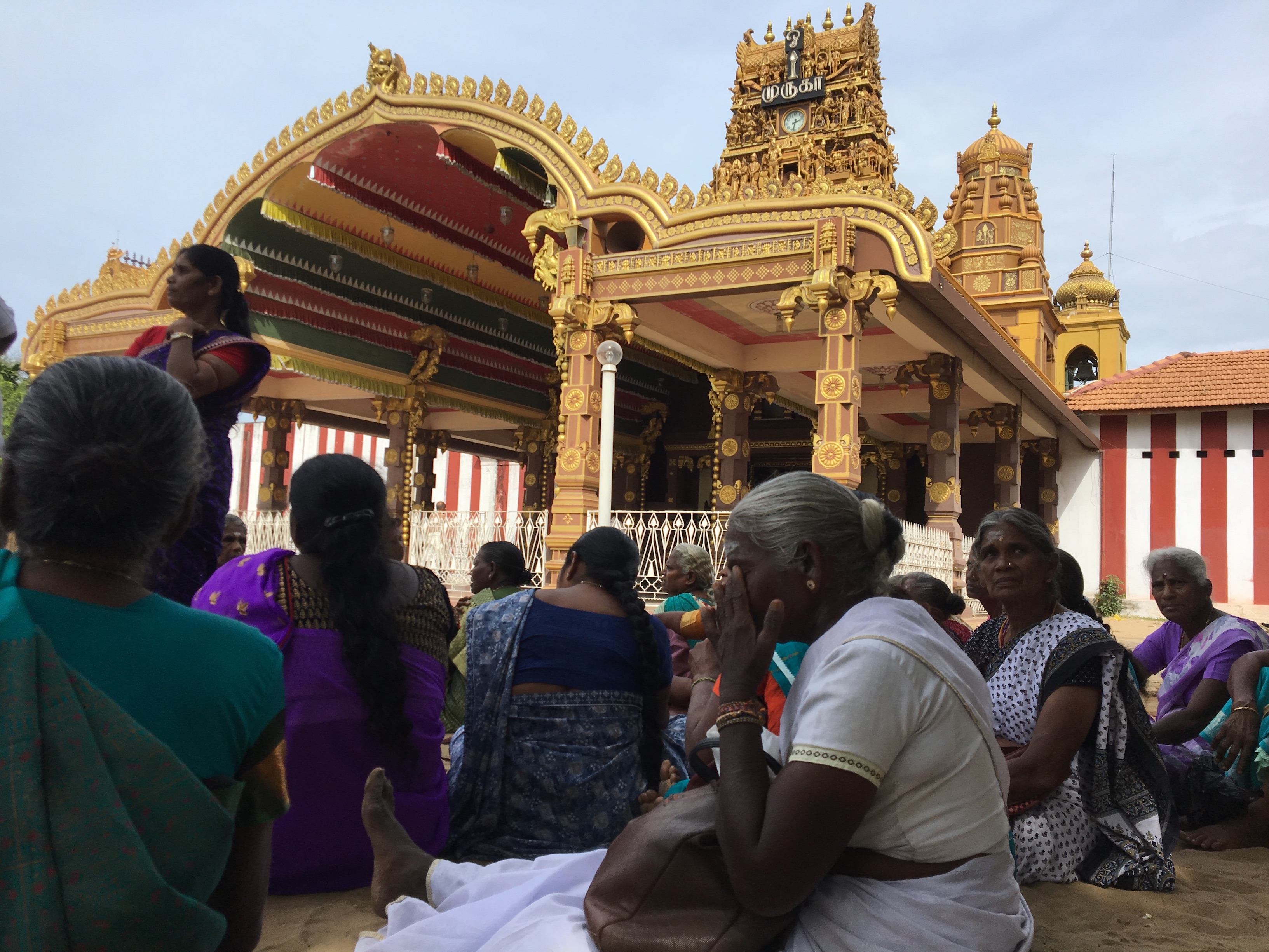 Families of the Disappeared reached the 500-day mark of continuous protest in July of 2018.
Families of the Disappeared reached the 500-day mark of continuous protest in July of 2018.
The protesting families expressed their disappointment with the
government's inaction as well as the silence of Tamil elected
representatives.
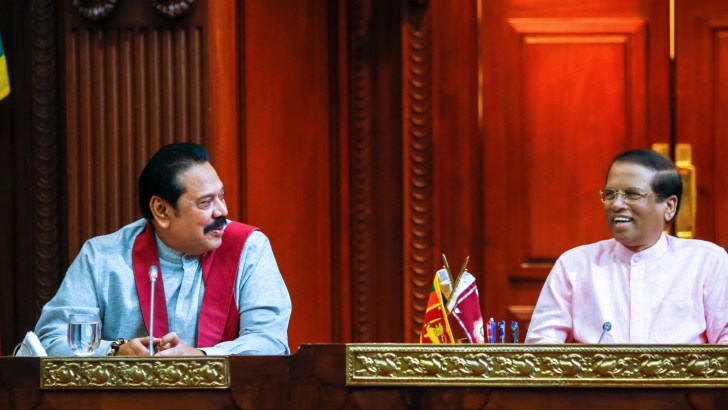
Chaos ensued as former President Mahinda Rajapaksa made a (short-lived) return as Prime Minister.
Tamil activists, journalists, and human rights defenders were
especially cautious of what Rajapaksa’s return might mean for their
safety.
Rajapaksa resigned on December 15th.
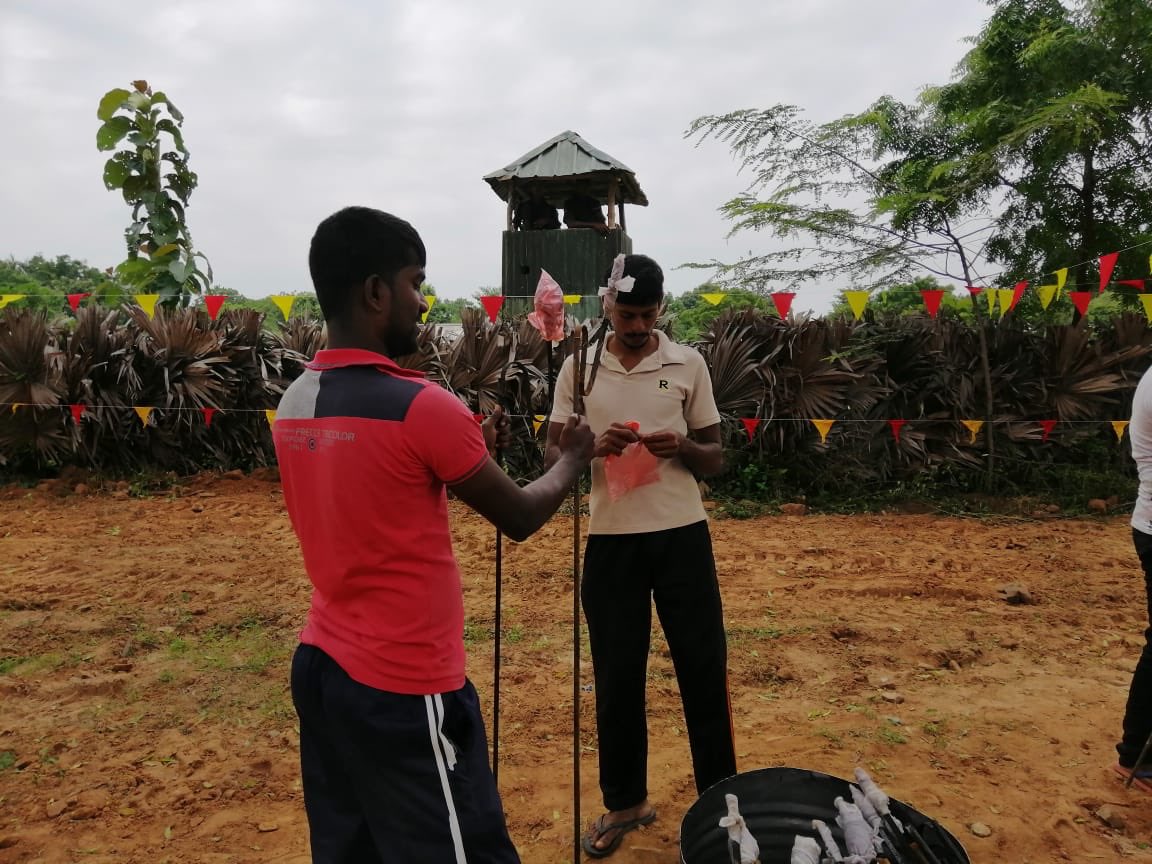
There was a clear heightened security presence leading up to and during Maaveerar Naal commemoration across the Tamil homeland.
However, this did not deter the community from remembering their loved ones.
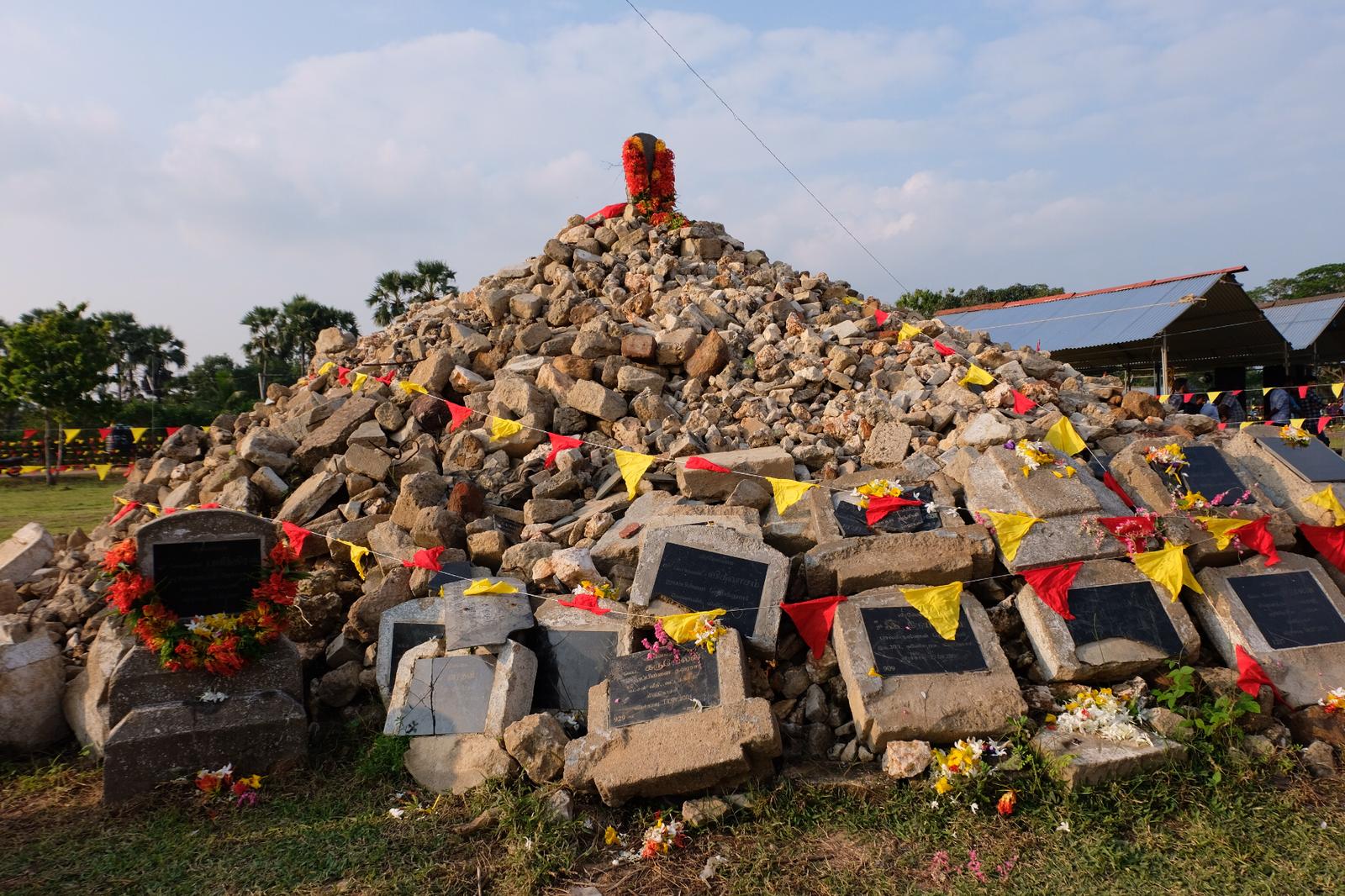
Eelam Tamils commemorated Maaveerar Naal on November 27, coming
together to remember and pay tribute to the Maaveerar - those who gave
their lives for the struggle for liberation.
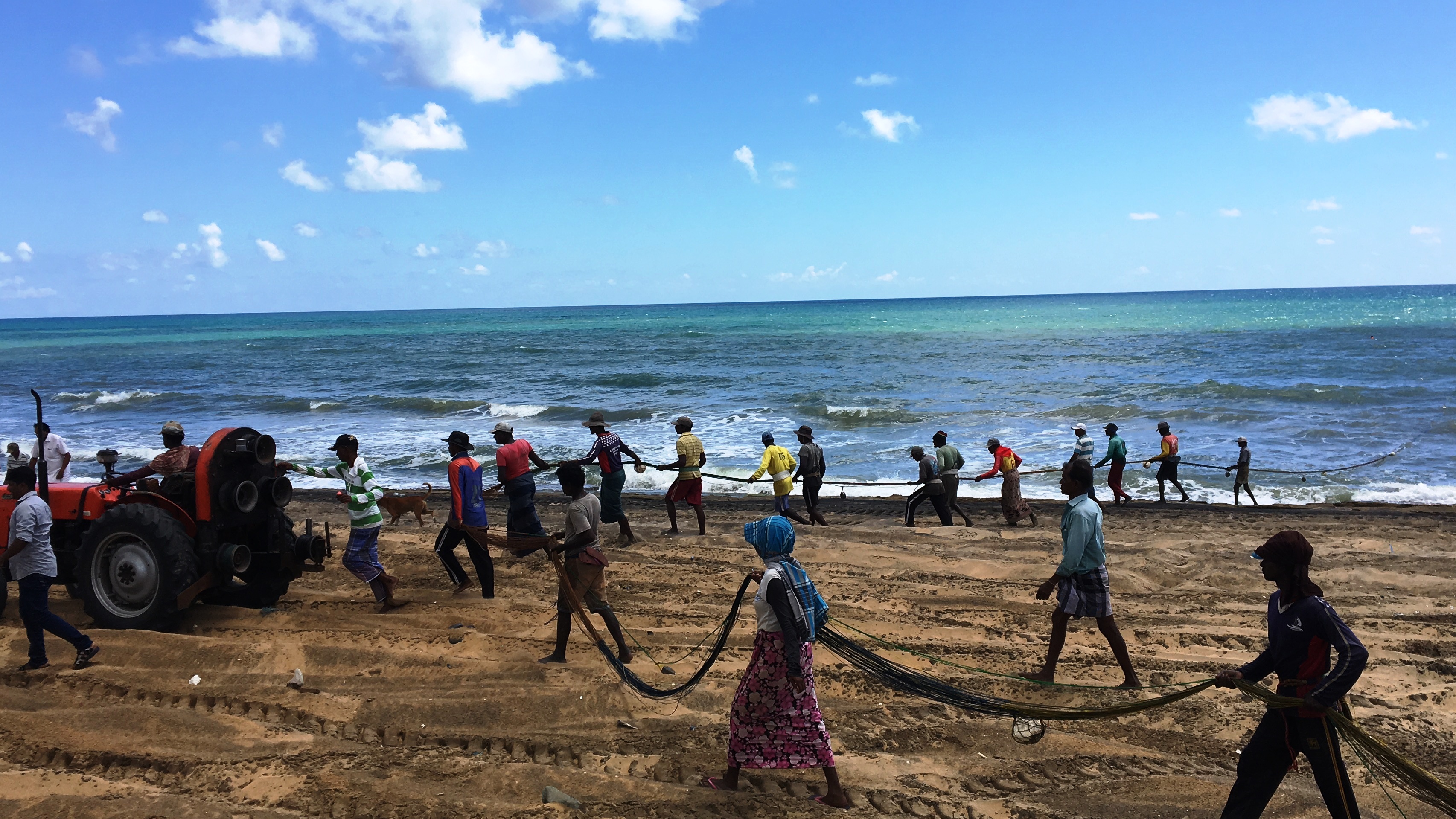 Sinhala
fishermen have been engaging in illegal fishing activity in Vadamarachi
and Mullaitivu. The methods used are also harmful to the environment.
Sinhala
fishermen have been engaging in illegal fishing activity in Vadamarachi
and Mullaitivu. The methods used are also harmful to the environment.
Tamil fishermen who held protests against the enroachment of their fishing areas were threatened by Sri Lankan intelligence.
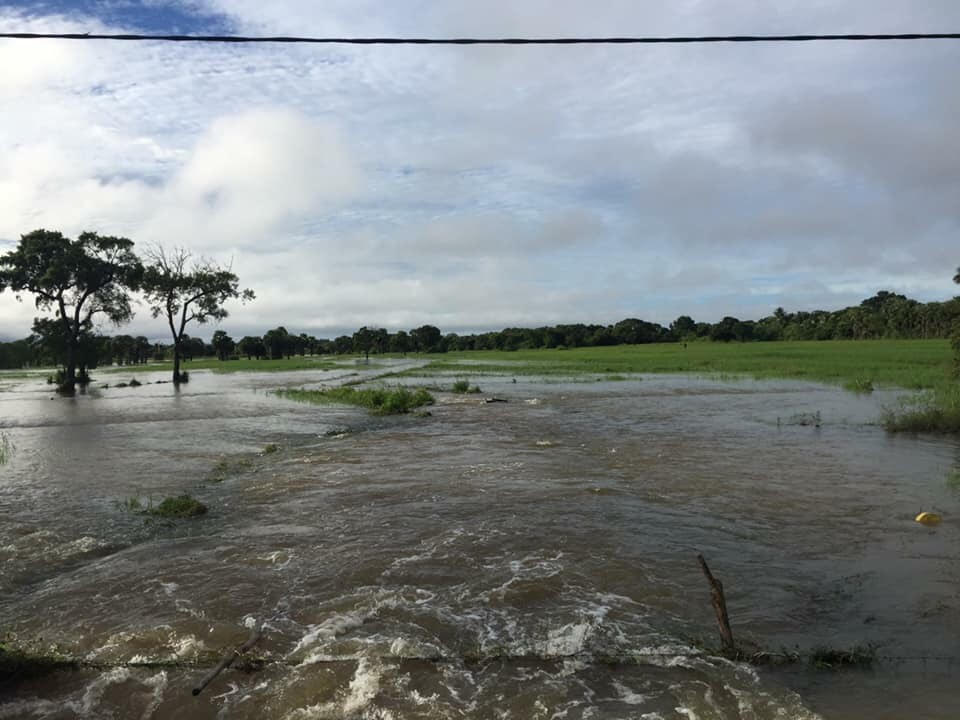
Hundreds were affected by flood in Kilinochchi following heavy rains in December.
Lakes in the region have burst their banks, flooding streets and making them impassable.
Flood reliefs by local civil society organizations, student
bodies and diaspora funded charities continue as thousands of Tamils
remain affects by extreme flooding in the Vanni area with key roads cut
off and houses still immersed in water.
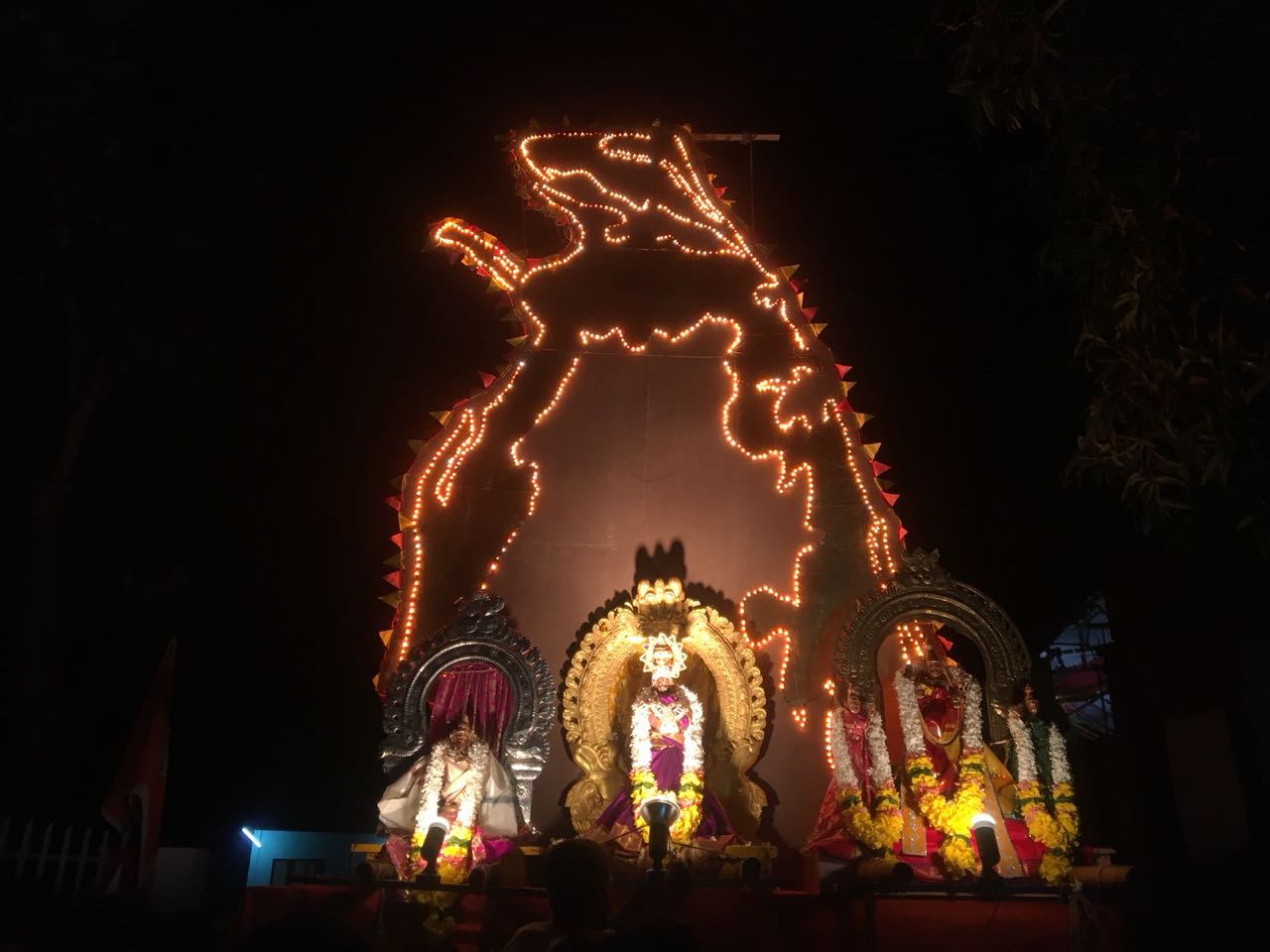 In
2018, Tamil Guardian celebrated 20 years of reporting,
providing context and commentary on Tamil affairs. However, it is also
important to reflect on the immense risk Tamil journalists face while
reporting in the North East.
In
2018, Tamil Guardian celebrated 20 years of reporting,
providing context and commentary on Tamil affairs. However, it is also
important to reflect on the immense risk Tamil journalists face while
reporting in the North East.
Jaffna editors of Uthayan, Valampuri and Thinakkural were
interviewed by the Terrorism Investigation Department (TID) in relation
to Tamil homeland display at a temple festival in Aanaikkottai.
A Tamil Guardian correspondent was also summoned by the TID and became the target of constant harassment.
We look back at 2018's top news stories and significant issues through images from throughout the year.
.jpg)
 02 January 2019
02 January 2019
Despite the calls for demilitarization of the North-East, the military was persistent in its hold on large sections of land while also directly impacting the livelihoods of Tamils through other means.
The integration of the Sri Lankan military into the everyday lives of the Tamil people is seen through the opening on several new army buildings, engagement with school children, and conducting interviews for construction jobs in Tamil areas.

Residents in Mullaitivu responded to the Department of Archaeology’s attempt to acquire more land by arriving in large numbers to stop the officials who were setting up equipment to survey the land.
The residents demanded that they leave.

In Keppapulavu, families demanding the release of their land reached a year of protest in March and 500 days in July.
On the last day of the 2018, having reached day 671 of their protest, the families attempted to enter their land, defying the army that occupies it.
Army officials did not speak with them and instead photographed and filmed the protesting families.

Tamil women from Iranaitivu led a massive protest and sailed back to their island and refused to leave until they were told their land would be returned to them.
300 strong, the villagers raised white flags to show the occupying military that their protest was a peaceful one.

Throughout the year, protests demanding the release of all political prisoners were held across the North-East.
8 Tamil Political prisoners started a hunger strike in Anuradhapura prison in September.
Jaffna University students completed a 194 km march to Anuradhapura prison, to intensify campaigns for the release of political prisoners.

9 years later, Tamils, across the North-East, remembered the height of the genocide in 2009.
Families of the Disappeared reached a year of road side protests demanding information about their loved ones.
The families continued their protested despite the constant surveillance and intimidation by Sri Lankan intelligence.

 Families of the Disappeared reached the 500-day mark of continuous protest in July of 2018.
Families of the Disappeared reached the 500-day mark of continuous protest in July of 2018.
The protesting families expressed their disappointment with the government's inaction as well as the silence of Tamil elected representatives.

Chaos ensued as former President Mahinda Rajapaksa made a (short-lived) return as Prime Minister.
Tamil activists, journalists, and human rights defenders were especially cautious of what Rajapaksa’s return might mean for their safety.
Rajapaksa resigned on December 15th.

There was a clear heightened security presence leading up to and during Maaveerar Naal commemoration across the Tamil homeland.
However, this did not deter the community from remembering their loved ones.

Eelam Tamils commemorated Maaveerar Naal on November 27, coming together to remember and pay tribute to the Maaveerar - those who gave their lives for the struggle for liberation.
 Sinhala
fishermen have been engaging in illegal fishing activity in Vadamarachi
and Mullaitivu. The methods used are also harmful to the environment.
Sinhala
fishermen have been engaging in illegal fishing activity in Vadamarachi
and Mullaitivu. The methods used are also harmful to the environment.
Tamil fishermen who held protests against the enroachment of their fishing areas were threatened by Sri Lankan intelligence.

Hundreds were affected by flood in Kilinochchi following heavy rains in December.
Lakes in the region have burst their banks, flooding streets and making them impassable.
Flood reliefs by local civil society organizations, student bodies and diaspora funded charities continue as thousands of Tamils remain affects by extreme flooding in the Vanni area with key roads cut off and houses still immersed in water.
 In
2018, Tamil Guardian celebrated 20 years of reporting,
providing context and commentary on Tamil affairs. However, it is also
important to reflect on the immense risk Tamil journalists face while
reporting in the North East.
In
2018, Tamil Guardian celebrated 20 years of reporting,
providing context and commentary on Tamil affairs. However, it is also
important to reflect on the immense risk Tamil journalists face while
reporting in the North East.
Jaffna editors of Uthayan, Valampuri and Thinakkural were interviewed by the Terrorism Investigation Department (TID) in relation to Tamil homeland display at a temple festival in Aanaikkottai.
A Tamil Guardian correspondent was also summoned by the TID and became the target of constant harassment.
.jpg)
 02 January 2019
02 January 2019Despite the calls for demilitarization of the North-East, the military was persistent in its hold on large sections of land while also directly impacting the livelihoods of Tamils through other means.
The integration of the Sri Lankan military into the everyday lives of the Tamil people is seen through the opening on several new army buildings, engagement with school children, and conducting interviews for construction jobs in Tamil areas.

Residents in Mullaitivu responded to the Department of Archaeology’s attempt to acquire more land by arriving in large numbers to stop the officials who were setting up equipment to survey the land.
The residents demanded that they leave.

In Keppapulavu, families demanding the release of their land reached a year of protest in March and 500 days in July.
On the last day of the 2018, having reached day 671 of their protest, the families attempted to enter their land, defying the army that occupies it.
Army officials did not speak with them and instead photographed and filmed the protesting families.

Tamil women from Iranaitivu led a massive protest and sailed back to their island and refused to leave until they were told their land would be returned to them.
300 strong, the villagers raised white flags to show the occupying military that their protest was a peaceful one.
Throughout the year, protests demanding the release of all political prisoners were held across the North-East.
8 Tamil Political prisoners started a hunger strike in Anuradhapura prison in September.
Jaffna University students completed a 194 km march to Anuradhapura prison, to intensify campaigns for the release of political prisoners.

9 years later, Tamils, across the North-East, remembered the height of the genocide in 2009.
The families continued their protested despite the constant surveillance and intimidation by Sri Lankan intelligence.

An independent collective of Tamil-Canadian activists
organized a rally in Toronto in solidarity with Tamil Families of the
Disappeared who were reaching 500 days of continuous roadside protests.
This rally kicked off a series of international rallies in London, Zurich, New York, Berlin, Vancouver, Belfast and Sydney.The protesting families expressed their disappointment with the government's inaction as well as the silence of Tamil elected representatives.

Chaos ensued as former President Mahinda Rajapaksa made a (short-lived) return as Prime Minister.
Tamil activists, journalists, and human rights defenders were especially cautious of what Rajapaksa’s return might mean for their safety.
Rajapaksa resigned on December 15th.

There was a clear heightened security presence leading up to and during Maaveerar Naal commemoration across the Tamil homeland.
However, this did not deter the community from remembering their loved ones.

Eelam Tamils commemorated Maaveerar Naal on November 27, coming together to remember and pay tribute to the Maaveerar - those who gave their lives for the struggle for liberation.
Tamil fishermen who held protests against the enroachment of their fishing areas were threatened by Sri Lankan intelligence.

Hundreds were affected by flood in Kilinochchi following heavy rains in December.
Lakes in the region have burst their banks, flooding streets and making them impassable.
Flood reliefs by local civil society organizations, student bodies and diaspora funded charities continue as thousands of Tamils remain affects by extreme flooding in the Vanni area with key roads cut off and houses still immersed in water.
 In
2018, Tamil Guardian celebrated 20 years of reporting,
providing context and commentary on Tamil affairs. However, it is also
important to reflect on the immense risk Tamil journalists face while
reporting in the North East.
In
2018, Tamil Guardian celebrated 20 years of reporting,
providing context and commentary on Tamil affairs. However, it is also
important to reflect on the immense risk Tamil journalists face while
reporting in the North East. Jaffna editors of Uthayan, Valampuri and Thinakkural were interviewed by the Terrorism Investigation Department (TID) in relation to Tamil homeland display at a temple festival in Aanaikkottai.
A Tamil Guardian correspondent was also summoned by the TID and became the target of constant harassment.
